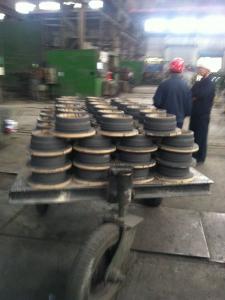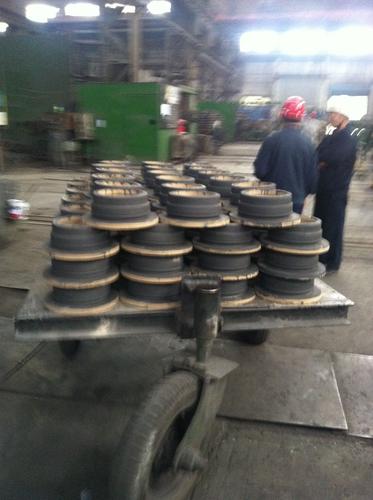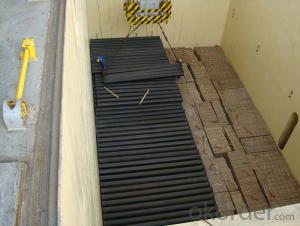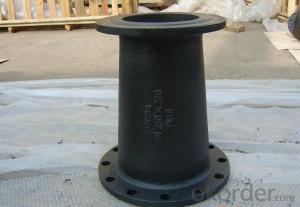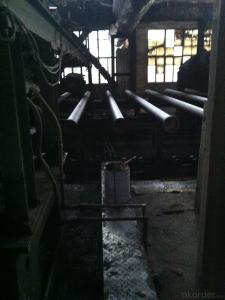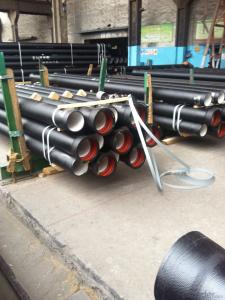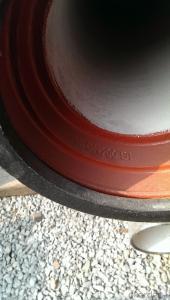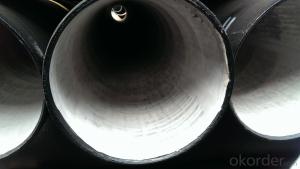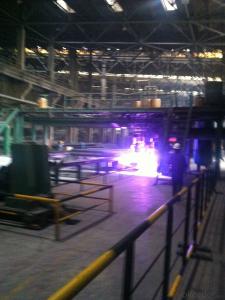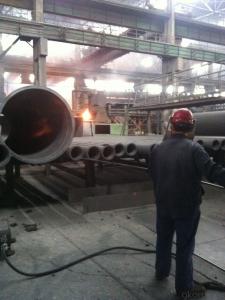DUCTILE IRON PIPES & FITTINGS K7CLASS DN500
- Loading Port:
- Tianjin
- Payment Terms:
- TT OR LC
- Min Order Qty:
- 33 pc
- Supply Capability:
- 3000 pc/month
OKorder Service Pledge
OKorder Financial Service
You Might Also Like
Specifications
· Material : Ductile Cast Iron
· Size Range : DN 80mm to DN 2000mm
· Unit Effective Length : 6m or 5.7m
· Manufacture Standard: ISO 2531:1998/ EN 545:2006/EN 598:2007
· Annual capacity : 200,000 tons
· Coating Exterior: Zinc 130g/m2 according to ISO 8179-1 and bitumen coating 70 microns.
· Cement Interior: Portland Cement/ High Alumina Cement/ Sulphate Resisting Cement Lining according to ISO 4179
· Special requirements on external coating and internal lining can be applied
· We also provide accessories such as SBR/EPDM rubber gaskets, lubricant paste, pipe caps, PE sleeves, etc.
Additional Parts:
Each pipe is strictly inspected according to related standard to ensure permanently high performance.
Easy Installation at site and service free for life
Long Service Lifespan
Quotation will arrive you within 24hours once we get your inquiry.
We guarantee offering you a competitive price.
A copy of original inspection reports of pipes will be offered after shipment.
Photos of loading process will be sent to the customer after shipment effect.
We will follow-up the delivery progress after shipment effect and update to the customer on weekly basis.
- Q: Ways of connecting ductile iron pipes
- In accordance with the wall thickness or pressure capacity, ductile iron pipe is divided into K8, K9, K10, K11, K12 four class, where the contract does not indicate, according to K9 supply.
- Q: Can ductile iron pipes be used in high-pressure applications?
- High-pressure applications can indeed utilize ductile iron pipes. These pipes boast impressive strength and durability, which renders them suitable for managing high-pressure fluids or gases. When compared to alternative pipe types like PVC or HDPE, ductile iron pipes possess a higher pressure rating. Moreover, they exhibit excellent resistance to external loads and have the capacity to endure high internal pressures. Water and wastewater systems frequently employ these pipes, alongside industrial settings that encounter high-pressure conditions. Nevertheless, it is crucial to guarantee that ductile iron pipes utilized in high-pressure scenarios adhere to the necessary standards and specifications to assure safe and dependable operation.
- Q: What is the average weight of ductile iron pipes?
- The weight of ductile iron pipes can differ based on their specific dimensions and specifications. However, as a general rule, the weight of ductile iron pipes usually falls within the range of 50 to 200 pounds per foot. Various factors, including the pipe's diameter, wall thickness, and length, affect its weight. It is essential to understand that these weights are averages, and the actual weight of a particular ductile iron pipe may differ. To accurately determine the weight of a ductile iron pipe, it is recommended to consult the manufacturer's specifications or engineering guidelines.
- Q: Are ductile iron pipes suitable for underground river crossings?
- Indeed, underground river crossings can be facilitated by the use of ductile iron pipes. Ductile iron, being a robust and long-lasting material, can endure the external stresses and burdens encountered in such crossings. With its superb tensile strength, impact resistance, and durability, ductile iron is exceptionally well-suited for underground applications where the pipes may face elevated water pressure, ground displacement, or various environmental influences. Furthermore, ductile iron pipes possess an extended lifespan and are impervious to corrosion, a vital attribute when dealing with water crossings. Their capacity to withstand these circumstances renders them a dependable choice for underground river crossings.
- Q: Can ductile iron pipe be used for wastewater treatment plant sludge dewatering?
- Ductile iron pipe is suitable for the dewatering of sludge in wastewater treatment plants. Its durability, strength, and resistance to corrosion make it a popular choice in these facilities. The pipes can withstand the harsh conditions and abrasive characteristics of the sludge dewatering process. Moreover, their leak-proof joints are essential in preventing any sludge leakage during dewatering. Furthermore, ductile iron pipes come in different sizes and are easy to install, making them a convenient option for wastewater treatment plant sludge dewatering.
- Q: What are the interface forms of ductile iron pipes? The best drawings are available. Thank you
- Because of this interface and the corresponding T sealing aprons can withstand greater deflection angle and greater tolerances, especially suitable for unstable formations and corners.
- Q: What's the difference between ductile iron pipe and cast iron pipe?
- Ductile iron pipe is based on cast iron, changed some of the characteristics of the structure of iron, so that it has become a lot of toughness, than the cast iron pipe is too brittle shortcomings much better, the tensile strength of the pipe bending strength greatly improved. The sealing material used in the socket interface is rubber ring.
- Q: How many casting methods are there in ductile iron casting? A 60*6 discus can not have sand holes. Its surface is smooth. What process can be used to make it?
- Is it better to use precoated sand, but only a little higher cost?.
- Q: How are ductile iron pipes different from cast iron pipes?
- Ductile iron pipes are different from cast iron pipes in terms of their composition and properties. Ductile iron pipes are made from a type of cast iron that has been treated with magnesium to improve its strength and flexibility. This makes ductile iron pipes more durable, impact-resistant, and less prone to cracking or breaking compared to traditional cast iron pipes. Additionally, ductile iron pipes have a higher tensile strength, allowing them to withstand higher internal and external pressures. In summary, ductile iron pipes are a more modern and advanced version of cast iron pipes, offering improved performance and longevity.
- Q: The plug connection DN800 ductile iron pipe has been installed. "Shall I think so?"
- Ductile iron pipes are defined as pipes made by casting more than 18 of casting molten iron by adding a spheroidal agent and then centrifugally centrifugally cast by a centrifugal nodular cast iron machineDuctile iron pipe ([span]Ductile Cast Iron Pipes), referred to as ball pipe, ductile iron pipe and ductile iron pipe etc..
Send your message to us
DUCTILE IRON PIPES & FITTINGS K7CLASS DN500
- Loading Port:
- Tianjin
- Payment Terms:
- TT OR LC
- Min Order Qty:
- 33 pc
- Supply Capability:
- 3000 pc/month
OKorder Service Pledge
OKorder Financial Service
Similar products
Hot products
Hot Searches
Related keywords
